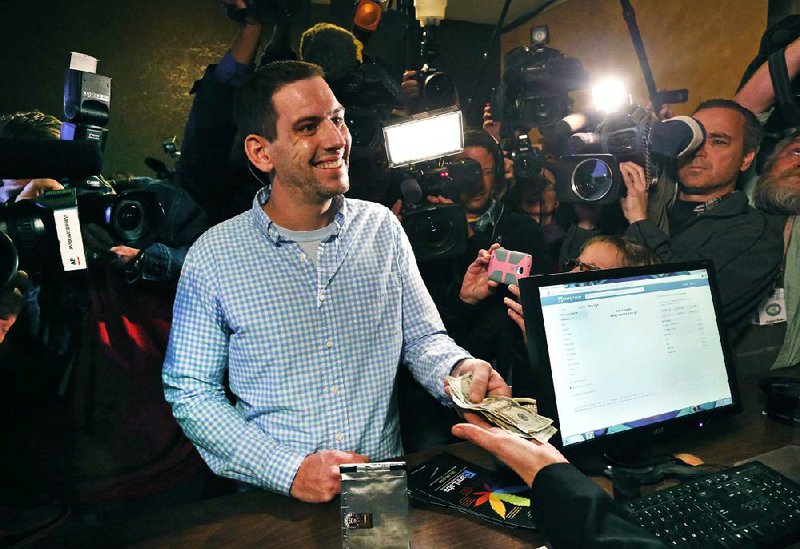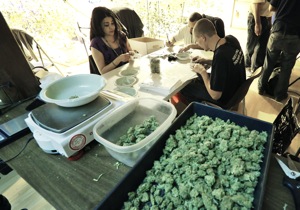DENVER - Crowds were serenaded by live music as they waited for the nation’s first legal recreational marijuana shops to open. They ate doughnuts and funnel cakes as a glass blower made smoking pipes. Some tourists even rode around in a limousine, eager to try the drug but not so eager to be seen buying it.
And when the sales began, those who bought the drug emerged from the stores, receipt held high and carrying sealed shopping bags, to cheers.
“I’m going to frame the receipt when I go home, to remind myself of what might be possible: legal everywhere,” said musician James Aaron Ramsey, 28, who had served time in jail for marijuana possession in Missouri. He played folk tunes with his guitar for those in line.
Activists hope he’s right and that the experiment in Colorado will prove to be a better alternative to the costly American-led drug war, produce revenue for state schools and save the government the expense of locking up drug offenders.
Just on the first day, prices had already risen to more than $500 an ounce, boosted in part by taxes in excess of 25 percent.
In both Colorado and Washington state, recreational marijuana has been legal for more than a year. Adults can smoke it in their living rooms and eat marijuana-laced cookies without fear of arrest. In Colorado, they are even allowed to grow up to six plants at home. But until Wednesday, dispensaries could sell only if a customer had a doctor’s recommendation and state-issued medical-marijuana card.
Now, any Colorado resident who is 21 can buy up to an ounce of marijuana at one of the 40 dispensaries that began selling to retail customers Wednesday. Out-of-state visitors can buy a quarter-ounce, but they must use it within the state.
Washington state will open its marijuana industry later this year. Both states’ programs will be watched closely not just by officials in other states, but by activists and governments in other countries, because the programs will be the first to regulate the production and sale of the drug.
Some countries have decriminalized marijuana, and the Netherlands lets people buy and sell it, but it’s illegal to grow or process it.
Just as shops opened Wednesday, the Denver Police Department tweeted, “Do you know the law?” and linked to city websites on state and local laws that include bans on public consumption, driving under the influence, taking marijuana out of the state and giving it to anyone under 21.
Denver police said one person was issued a summons for public consumption. The Colorado State Patrol reported no marijuana-related incidents. No incidents were reported at Denver International Airport, where signs warned travelers that they can’t take the drug home.
However, Oklahoma authorities said they were bracing for an influx of marijuana after Colorado’s new law took effect Wednesday.
Cimarron County, which shares a border with Colorado, has seen a steady flow of marijuana crossing from Colorado for several years, Sheriff Bob White said. The sheriff told The Oklahoman that it doesn’t take drivers long to cross through his county in the panhandle en route to Texas from Colorado.
“There’s nothing here to attract anybody to stop,”White said.
At least 24 dispensaries in eight towns opened in Colorado.
Nearly 350 retail marijuana licenses have been issued to Colorado businesses, according to the Marijuana Enforcement Division, the agency under Colorado’s Department of Revenue that regulates the industry. The licenses included 136 dispensaries, 178 cultivation facilities and three testing sites.
In Denver, marijuana users welcomed the new year and the new industry by firing up bongs and cheering in a cloud of marijuana smoke at a 1920s-themed Prohibition Is Over party.
Shopper Jacob Elliott said he wrote reports in college about the need to end “pot” prohibition, but he never thought it could happen in his lifetime.
“This breaks that barrier,” said Elliott, who traveled to Colorado from Leesburg, Va., to be among the first to buy legal marijuana.
Preparation for the retail market started more than a year ago, soon after Colorado and Washington voters in 2012 approved legal marijuana industries. Uruguay passed a law in December to become the first nation to regulate marijuana, but the nation’s regulatory system isn’t in place yet.
Marijuana advocates, who had long pushed legalization as an alternative to the drug war, had argued that it would generate revenue for the state treasury - to support education in Colorado’s case - and save money by not locking up low-level drug offenders.
“I feel good about it. The money’s going to schools,” said shopper Joseph Torres of Denver.
Others who were waiting in line shared, over coffee and funnel cakes, stories of incarceration for possessing marijuana.
“Trafficking conviction. Nineteen years old. For a plant, how stupid,” said 24-year-old Brandon Harris, who drove 20 hours from Blanchester, Ohio.
Colorado set up an elaborate plant-tracking system to try to keep the drug away from the black market, and regulators set up packaging, labeling and testing requirements, along with potency limits for edible marijuana.
The U.S. Department of Justice outlined an eight point slate of priorities for marijuana regulation that require states to keep the drug away from minors, criminal cartels, federal property and other states to avoid a federal crackdown.
With the added police patrols, the airport warnings and various other measures, officials hoped they have enough safeguards in place to avoid predictions of public health and safety harm from the opening of the dispensaries.
The governor of Colorado and the mayor of Denver both opposed legalization, and both stayed away from the smoky celebrations Wednesday.
A group of addiction counselors and physicians said they’re seeing more marijuana addiction problems, especially in youths, and that wider marijuana availability will exacerbate the problem.
“This is just throwing gas on the fire,” said Ben Cort of the Colorado Center for Dependency, Addiction & Rehabilitation at the University of Colorado Hospital.
Some medical marijuana patients groups say they’re worried about supply. That’s because the retail inventory for recreational use is coming entirely from the pre-existing medical inventory. Many in the industry warned patients to stock up before the sales began.
While Colorado incorporates the existing medical marijuana system, Washington is starting from scratch, with all of the production and sale of recreational marijuana linked to the new system of licenses, which will not be issued until late February or early March.
For now, medical patients should have plenty of places to shop. Most of Colorado’s 500 or so medical marijuana shops haven’t applied to sell recreational marijuana, and many that have plan to serve both recreational and medical patients
The industry has given rise to not just shops, but a whole line of other businesses, including tours.
Addison Morris, owner of Rocky Mountain Mile High Tours, had 10 clients waiting inside a limousine who paid $295 for three hours of chauffeuring by a “marijuana concierge” who would help them choose strains and edible products.
Morris said she’s booked through the end of February with out-of-state clients, who get samples in designer bags. And for the tours, guests are asked to leave cameras at home. She said she’s selling discretion.
“We’re your grandmother’s ‘pot’ connection,” the 63-yearold said.
Information for this article was contributed by Kristen Wyatt and Jim Anderson of The Associated Press; by Jack Healy and Kirk Johnson of The New York Times; and by Shan Li of The Los Angeles Times.
Front Section, Pages 1 on 01/02/2014



